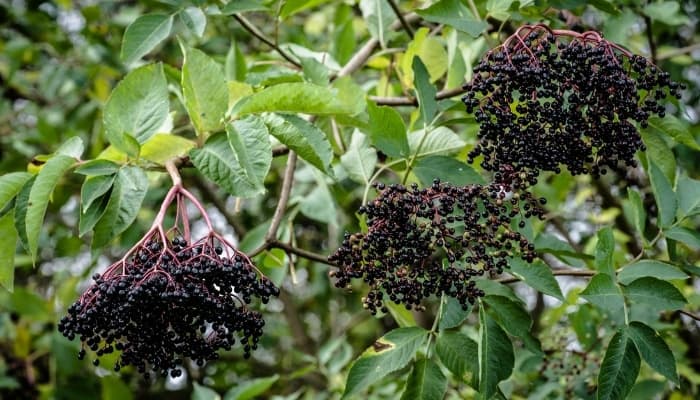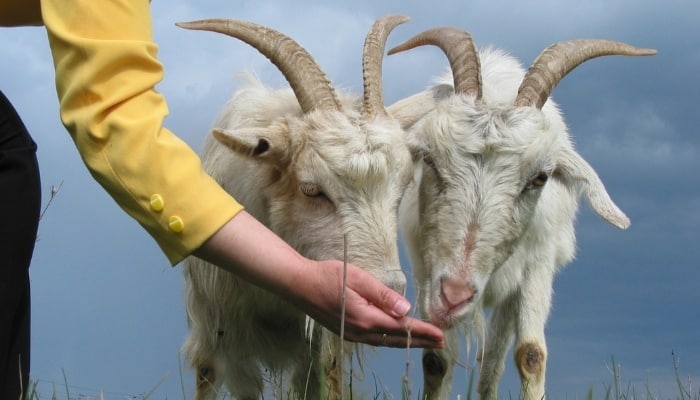The dark purple berries of elderberry are utilized for a multitude of purposes. These berries have the potential to improve your immune system, reduce stress, and contribute to the prevention and alleviation of flu symptoms.
However, if you are a goat owner, you might wonder if a goat can eat elderberry.
Can goats eat elderberry? It is generally considered safe for goats to eat ripe elderberries, and they can even have beneficial effects on a goat’s health. However, the plant’s roots, stems, leaves, and unripe berries can cause poisoning and severe digestional upset, especially if eaten in huge amounts.
With all that being said, let’s dive into the details. In this article, we will discuss everything you need to know about your goat eating elderberry.
Goats and Elderberry: Factors That Influence Danger
There are various factors that influence the danger to your goat if it eats elderberry. Let’s check them out!
1. Part of Plant Consumed
The leaves, roots, and stems of the elderberry are theoretically poisonous. They contain some unknown alkaloids and some cyanogens that can irritate the goat’s stomach.
2. Ripe vs. Unripe Berries
Unripe berries can be very dangerous and should be avoided at all costs. They contain certain compounds that can be potentially deadly.
However, you shouldn’t worry if you have an elderberry bush growing on your properly. Goats are usually smart enough to avoid unripe berries.
On the other hand, ripe berries are a sweet, healthy treat for your goat. You will know that the berry is ripe mainly by its color and juice. An unripe berry will be lighter, and the juice will be pale.
Despite popular belief, goats are not colorblind and can tell ripe from unripe berries by their color.
3. Amount Consumed
As mentioned, elderberries are only harmful when unripe. However, another thing to consider is moderation, or the goat might experience digestive pain and discomfort.
You should let your goats eat ripe elderberries only once or twice a week.
For the rest of the week, you should feed them other snacks. It will prevent them from getting bored and will ensure that they get a wide range of nutrients in their diet.
4. Age of Plant
Younger elderberry plants are believed to be more harmful than older, mature plants. Consider removing young elderberry plants from your pasture or fence them off from your goats.
5. Quality of Overall Diet
Another thing to note is that if the goat is well fed and has plenty of options available, it is much less likely to eat much elderberry.
Basically, the diet should consist of 50% grass hay, 25% pasture grazing, 20% grain, and up to 5% treats. However, these ratios will be different during the winter when ideal grazing is not available.
6. Overall Health of Goat
The overall health of a goat is another thing to consider. For example, the adverse effects of eating unripe elderberry will be significantly worse if the goat is not healthy, is elderly, or suffers from parasites.
We should also mention that ripe elderberries have positive effects on the goat’s health.
Like other berries, they have lots of essential vitamins, minerals, and antioxidants, which help to prevent radical molecules that make the goat sick.

Will Goats Eat Poisonous Plants?
Most of the time, goats will ignore poisonous plants. However, due to their need to browse, goats might try poisonous plants just for variety.
Some of the poisonous that you might grow in your backyard include foxglove, lantana, locoweed, and buttercup.
Goat Poisoning Symptoms
Signs of poisoning from elderberry can vary, but some of the most common are vomiting, diarrhea, and loss of appetite.
However, if a goat ingests too much unripe elderberry, it can even lead to death.
What To Do if Goat Eats Poisonous Plant
An essential thing is to notice the signs of poisoning as early as possible.
It is also beneficial to keep an activated charcoal paste on hand, which is great for removing the toxins before they get too far into the digestive tract.
You should also keep your goat hydrated, especially if it is vomiting. Additionally, you should buy goat electrolytes and give them to the goat to remove the toxins from its body.
If you notice that the symptoms are worsening, be sure to take your goat to the wet.
How To Get Rid of Elderberry?
The easiest way to get rid of elderberry is to do it in spring. As the new canes come up, simply cut them deeply to sever the rhizomes that would create new canes.
You will need to do it multiple times until you completely get rid of the plants. Obviously, you can fast forward the process by applying proper herbicides, but that is up to you.
Plants Toxic to Goats
Different toxic plants cause different symptoms of goats poisoning, but they should all be avoided. Let’s see what the most common plants that are poisonous to goats are.
- Rhododendron: Even a few leaves of this plant can cause poisoning symptoms to develop. In case of poisoning, the goat will become dull and depressed and might even experience difficulty with breathing a few days later.
- Ragwort: This plant causes severe damage to the liver with irreversible effects, and there is no treatment for poisoning. The symptoms include loss of condition and poor appetite. In severe cases, the eyes and mouth will become yellow.
- Kale: Excessive amounts of kale can lead to the damage of red blood cells. Some of the symptoms include red urine and anemia. However, if caught early, kale poisoning is easy to deal with: simply move the goat off of the kale onto hay or grass.
- Oak Leaf: In moderation, oak leaves are relatively harmless. However, excessive feeding will cause damage to the bone marrow and might even result in anemia.
- Fruit Tree Leaf: These leaves contain amygdalin, which can be poisonous to the goat. While fresh leaves do not cause any harm, dry leaves have amygdalin that changes and binds to the red blood cells. It prevents them from carrying oxygen, which eventually leads to respiratory distress.
Related Questions:
Can Goats Eat Poison Ivy?
Poison ivy is not harmful to goats. In fact, goats like thick and leafy plants such as poison ivy and are sometimes used to help clear an area of the annoying, persistent plant.
Is Elderberry Toxic to Dogs?
Ripe elderberries are not toxic to dogs, but most dogs are not able to recognize whether the plant’s berries are ripe or not.
There are numerous elderberry supplements, like this immune booster, available specifically for dogs. If you plan on feeding ripe berries from your yard, speak with your vet about serving sizes first.
Conclusion
We hope we have clarified everything that you need to know about elderberry plants. As long as the berries are ripe, they are perfectly safe for your goats.
Also, in most cases, a goat is able to tell apart ripe and unripe berries, so you can relax a bit if you have mature plants on your property that the goats can access.

